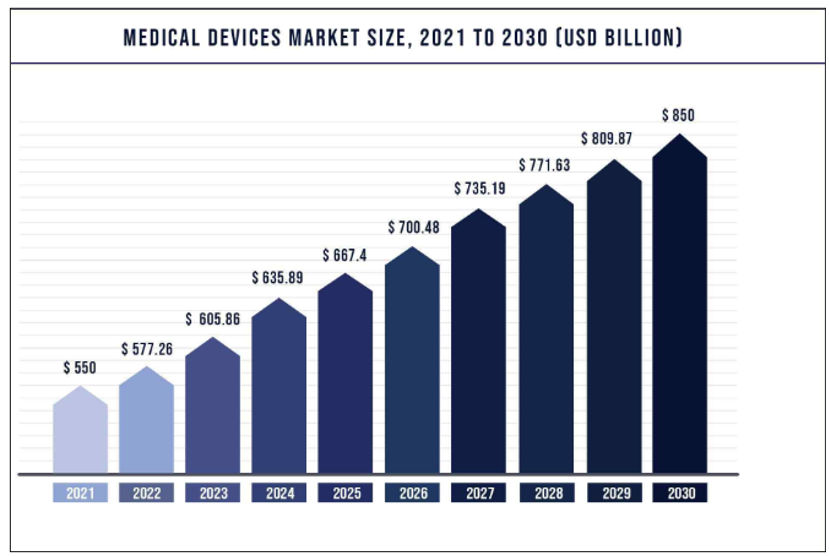The medical devices sector of the healthcare industry focuses on the design, development, manufacturing, and distribution of a wide range of medical devices and technologies. Medical devices encompass a broad spectrum of products, from simple and low-risk devices like thermometers and bandages to complex and high-risk devices like pacemakers and robotic surgical systems. Medical devices with internet connectivity and Internet of Things (IoT) capabilities are gaining traction. These devices can transmit patient data in real-time to healthcare providers, enabling remote monitoring, better data analysis, and timely interventions.
AI and machine learning are being integrated into medical devices to enhance their capabilities. AI-powered devices can analyze vast amounts of data, improve diagnostics, predict patient outcomes, and assist healthcare professionals in making more informed decisions. Advances in medical device technology is driving the growth of minimally invasive surgical techniques and robotic-assisted surgery. These approaches offer benefits such as smaller incisions, reduced scarring, shorter recovery times, and improved surgical precision. As medical devices is becoming more connected and reliant on digital technologies, concerns about cybersecurity and data privacy increased. Ensuring the security of patient data and protecting medical devices from potential cyber threats is becoming important.
The global medical devices market exhibited a valuation of USD 577.26 billion in 2022, and it is projected to expand significantly, reaching approximately USD 850 billion by 2030. This growth trajectory is anticipated to be sustained by a compound annual growth rate (CAGR) of 5.5% during the forecast period from 2022 to 2030. In the United States, the medical devices market holds a substantial size, recording a value of USD 198.3 billion in 2022. These figures underscore the robust growth and economic importance of the medical devices sector on a global scale and within the U.S., signifying its role as a critical and evolving component of the healthcare industry.

Some of the leading companies in this sector include Abbott Laboratories, Agilent Technologies, Inc., Becton, Dickinson and Company, Medtronic plc, Baxter International Inc., etc. According to recent market research reports, the medical device industry is poised to undergo significant transformations driven by several key trends:
Industry Consolidation: The medical devices industry is expected to become more consolidated as companies merge to enhance revenue growth and offer combined solutions to healthcare providers. The top 15 companies already generate a substantial portion of the market’s revenues, and this trend is predicted to continue.
Shifting Regulatory Landscape: Regulatory requirements for medical devices have been evolving globally, impacting both pre-market approval and post-market safety and efficacy assessments. Navigating these changing regulations is critical for successful device development and market approval.
Increasing Use of Robotic Surgeries: Technological advancements are leading to a surge in robotic surgeries, enabling more precise and minimally invasive procedures. The surgical robotics market is projected to experience rapid growth, with the potential to improve surgical accuracy and efficiency.
Use of Artificial Intelligence and Machine Learning: Artificial intelligence (AI) and machine learning (ML) are being increasingly integrated into medical devices for various therapeutic applications. The AI/ML medical device market is expected to experience substantial growth, driven by a growing ecosystem of AI solutions and demand in fields like radiology and cardiology.
Rising Demand for Remote Patient Monitoring Devices: Remote patient monitoring devices are gaining popularity, particularly due to their role in managing chronic conditions and enabling telehealth services. The market for these devices is expected to grow significantly, with potential benefits for healthcare management and patient outcomes.
Growth of 3D Printing for Medical Devices: 3D printing is revolutionizing the medical industry by offering applications in surgical planning, training, and orthotics/prosthetics. The 3D printing medical devices market is projected to expand rapidly, driven by innovations and new possibilities in healthcare.
Increasing Importance of Cybersecurity: As healthcare becomes more digitally connected, cybersecurity becomes a critical concern. Medical device companies must prioritize cybersecurity measures to safeguard patient data and protect against cyberattacks, data breaches, and vulnerabilities.
These trends highlight the dynamic and transformative nature of the medical device industry, with advancements in technology, regulation, and patient care driving significant changes in how medical devices are developed, regulated, and utilized.
–Rimi Khemka (Crispidea Analyst)
To download equity report on helath care CLICK HERE
For More Information CONTACT US




